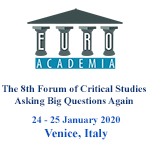Euroacademia Conferences
 Europe Inside-Out: Europe and Europeanness Exposed to Plural Observers (9th Edition) April 24 - 25, 2020
Europe Inside-Out: Europe and Europeanness Exposed to Plural Observers (9th Edition) April 24 - 25, 2020 Identities and Identifications: Politicized Uses of Collective Identities (9th Edition) June 12 - 13, 2020
Identities and Identifications: Politicized Uses of Collective Identities (9th Edition) June 12 - 13, 2020 8th Forum of Critical Studies: Asking Big Questions Again January 24 - 25, 2020
8th Forum of Critical Studies: Asking Big Questions Again January 24 - 25, 2020 Re-Inventing Eastern Europe (7th Edition) December 13 - 14, 2019
Re-Inventing Eastern Europe (7th Edition) December 13 - 14, 2019 The European Union and the Politicization of Europe (8th Edition) October 25 - 26, 2019
The European Union and the Politicization of Europe (8th Edition) October 25 - 26, 2019 Identities and Identifications: Politicized Uses of Collective Identities (8th Edition) June 28 - 29, 2019
Identities and Identifications: Politicized Uses of Collective Identities (8th Edition) June 28 - 29, 2019 The European Union and the Politicization of Europe (7th Edition) January 25 - 26, 2019
The European Union and the Politicization of Europe (7th Edition) January 25 - 26, 2019 7th Forum of Critical Studies: Asking Big Questions Again November 23 - 24, 2018
7th Forum of Critical Studies: Asking Big Questions Again November 23 - 24, 2018 Europe Inside-Out: Europe and Europeanness Exposed to Plural Observers (8th Edition) September 28 - 30, 2018
Europe Inside-Out: Europe and Europeanness Exposed to Plural Observers (8th Edition) September 28 - 30, 2018 Identities and Identifications: Politicized Uses of Collective Identities (7th Edition) June 14 - 15, 2018
Identities and Identifications: Politicized Uses of Collective Identities (7th Edition) June 14 - 15, 2018
Thinking about United Europe during the Interwar: Lessons for XXI Century?
-
-

-
Presentation speakers
- Vytautas Sinica, Faculty of Philosophy, Vilnius University, Lithuania
Abstract:
The European Union is going through one of the most difficult periods of its existence. Ever before it was growing through crises, using them as pretext for a deeper integration. Today EU encounters so many challenges, that it begs into question the previously self-evident premise that European integration is irreversible. Partisans of European unity are forced to search for new ways of integration. Europeans were in such search before. The Great War that followed relatively peaceful XIX century actualized the strife for European unification over again. The fact that Europeans were unable to avoid this war revealed that after disintegration of former supranational religious and political structures modern sovereign states of Europe could not control their common destiny. Ubiquitous sense of European demise followed, but as a reaction to it spread theoretical considerations about perspectives of European integration. Underlying principle that Europe must renew itself and be unified into „European federation“ became dominant in the elites of most European societies. Idea of European unity acquired different forms – from projects, inspired by neotomistic revival and supported by the Church (J. Maritain`s European federation) and Carl Schmitt`s new type of political communities to neomarxist paneuropean movement (R. N. Coudenhove-Kalergi „new Europeans“) and functionalist (D. Mitrany „effective peace systems“) visions. None of them were implemented until after World War II, when the position that political unification of Europe is a necessary requirement for its own survival finally prevailed. This presentation aims to a) examine interwar period`s visions of European unification and their philosophical foundations; b) determine, which elements of those interwar conceptions became parts of later European Community project and which were left unrealized; c) evaluate, in what ways elements of surveyed conceptions could contribute to the solution of the current European crisis.
-
Related Presentations

The Monstrous Woman Goes Grey: Film, Performance and Feminism
- Kathryn Cutler-MacKenzie













